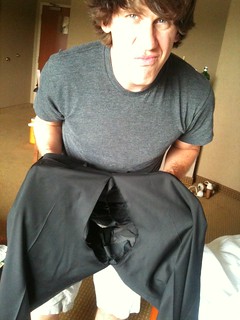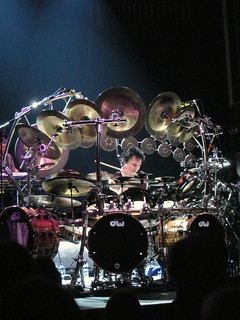 Photo by Dennis Crowley (CC)I've blogged a lot over the years about my pantsing ways (meaning I write by the seat of my pants and don't plan a lot ahead). And I've also admitted that I'm a pantser with plotter envy. I'm constantly reading structure and plotting books so that I can learn new methods and maybe find something that clicks with me.
Photo by Dennis Crowley (CC)I've blogged a lot over the years about my pantsing ways (meaning I write by the seat of my pants and don't plan a lot ahead). And I've also admitted that I'm a pantser with plotter envy. I'm constantly reading structure and plotting books so that I can learn new methods and maybe find something that clicks with me.
And I have had some things really help. Here's my current writing method when developing a story:
1. Fill out the Save the Cat beat sheet to give me an overarching structure.
2. Filling out the inner journey stages (from Michael Hauge's method) for both my hero and heroine. (To see more about that check out Janice Hardy's and Jami Gold's posts about Hauge's workshops.)
3. I write a one page synopsis to send to my editor. This reads more like back cover copy but does include the end.
4. Then I start writing.
5. After drafting, I go back and lay the Save the Cat structure over my manuscript to make sure I'm hitting the turning points at the right percentages (or at least close) to make sure my pacing is on point.
6. Then I check to make sure my characters have made a full arc.
7. Last, I fine tune edit things using a lot of Margie Lawson Deep-Editing techniques--though I haven't had time to do the full highlighter method yet.
All right, so that seems like a pretty thorough process, right? It's gotten me through three books and two novellas (well I probably shouldn't count CRASH because I just pantsed my ass off with that one.)
But here's the thing, I kind of hate pantsing. It goes completely against my personality. I'm the girl who doesn't like surprises, who wants to know what the plan is, and who wants a method for everything. I always want to be prepared. I'm the girl who enjoys following recipes and not effing around with extra pinches of this and that. And if I go to the grocery store without a list, I'm lost and completely uninspired on what to cook. I like to plan out what I'm cooking for dinner every night, earmark those recipes, and then go to the store with a grocery list divided by sections of the store. I'm the person who actually reads the instructions (or tries to) when building IKEA furniture.
But then I have these weird quirks outside of that box--like I HATE planning vacations. I don't want to know every single thing I'm going to do or every place I'm going to eat. My husband loves that so I leave it to him. And as much as I like routine, I hardly ever cook the same thing twice. That's why I have a bazillion cookbooks and subscribe to three different cooking magazines. I want something new every night. And I don't reread books--even the ones I love--because I've already been there done that.
So I have this strange combination of plotter and panster tendencies in my life and it leaves me with some screwed up hybrid of a process.
And that wouldn't be a problem; a hybrid process can be fine. But not when it makes me anxious and on edge. Most pantsers I know are those writers that can bust out a book in a few weeks. They don't stop and edit as they go. They just freewheel and the words pour out of them. But then they know that at the end, they'll be left with a big editing and rewriting process. And they're okay with that.
Then the plotters I know are more the perfectionist type. They may edit as they go. They have a nice outline they are following and note cards stacked up on what happens next. They may take a lot longer to write a book but at the end, the edits are more minor because they've been tweaking the whole time.
Then there's me. I'm a slow writer who edits as I go AND writes by the seat of my pants. This results in a neurotic, perfectionistic author who is constantly stressed over the book not working and not knowing where to go next. It's insanity. (Can you tell I'm in the middle of drafting a book under a tight deadline?)
I have tried to be more plotter-oriented but haven't had much success with that so far. But I am not giving up. I feel like I need to learn to play on one side of the fence or the other. I either need to learn to let go of the perfectionist side of myself and just dump a first draft on the page. OR I need to pick some method and really commit to trying to plot a book. Maybe not some crazy scene by scene outline but something to fluff out the broad beat sheet I'm currently using.
My inclination is to try the plotting way again first because I've attempted to just "write without looking back" but haven't been able to do that thus far. Perfectionists die hard.
So what's your method? Does yours feel comfortable to you? Does your method match your personality or are you like me?
